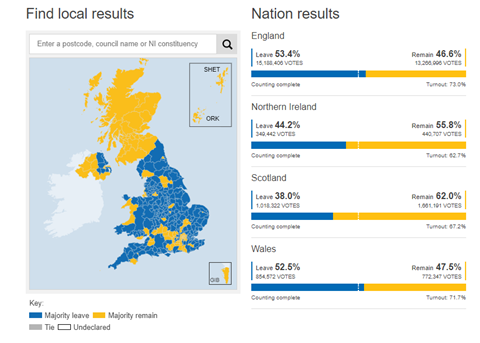The year 2016 saw one of the biggest referendum events of a lifetime – the EU referendum. Four years and three prime ministers later, the future of the UK’s European position still hangs in a precarious limbo. But alas, we wait on the looming no-deal Brexit of 31st December 2020 (this my personal pessimistic prediction).
Moving on to the topic of this blog though; what does this mean for the United Kingdom. Keyword here being ‘united’. The United Kingdom is made up of England, Wales, Scotland and Northern Ireland. Prior to the 2016 EU referendum, Scotland tried its luck with a referendum of its own – to become an independent country. Unfortunately, this agenda fell short of its ambitious aim with a 55.30% no vote. Now that the UK is set to cut ties with its pals across the channel, the odds seem to fall in the interests of Scottish independence.
Nicola Sturgeon, the First Minister of Scotland, has recently announced plans for a second independence referendum. On the grounds that the Brexit vote has ”immeasurably strengthened” the case for Scottish exit. Understandably, due to the time pressures of putting together a referendum of this size, the First Minister has indicated this case will be put forward at the next election in May 2021.
In the wake of Brexit and the possibility of independence, Sturgeon has unveiled an ‘Inward Investment Plan’ with the aim of creating 100,000 high quality jobs over the next decade. With the hopes of Scotland being able to “shape [its] own destiny”, the increase in borrowing powers are in sights to massively boost the nation’s battered economy. Latest polling results indicate the Scottish National Party’s (SNP) majority in the next election is “likely”. By way of further evidence, the SNP’s 2019 General Election manifesto stated that the party intended to hold a second referendum in 2020. The party then won an outstanding majority of 48 out of 59 possible seats. A poll conducted last month by Panelbase suggested support for Scottish independence has reached a high of 55%.
This case however is not without criticism as leader of the SNP, has faced objections from her Conservative and Labour Party counterparts. The Scottish Conservative leader Douglas Ross tweeted in response “we need to take Scotland forward and recover from this crisis together, not go back to the divisions of the past”. Whilst Labour’s shadow Scottish Secretary Ian Murray followed this by describing Ms Sturgeon’s announcements as “reckless”, evidencing her priority to “divide the people of Scotland”.
So, the question now is, why does Brexit strengthen the case for independence? Let us delve in!

As we see from the infographic, courtesy of the BBC, every council in Scotland saw a majority of remain votes. The overall split of 62% remain to 38% leave shows the overarching support for the Scots to remain in the EU.
Interesting! Although, the Scottish support for the EU wasn’t always as it seems. The SNP first opposed UK’s membership of the EU in the 1975 referendum. However, opinions changed as the Scots reaped the benefits of the EU’s structural funds and investments to poorer parts of the bloc. In an interview with The Atlantic magazine, Ewan Gibbs, a historian at the University of the West of Scotland stated the EU provided Scotland with “the means to navigate deindustrialization and transition to new forms of economic activity.” Hence we can understand why there was much support on the remain side in the North. Over the years, tethers between Scotland and the UK have weakened due to deindustrialisation, the influence of the EU in the North and the devolution of Scottish powers to its own legislature (Scottish Parliament).
In another economic regard, the severed trade flows between Scotland and the EU would create difficulties for the exporter. Restrictions to Scotland’s open access for goods would not fare well for its economy. To add to the rivalry of the English and Scottish governments, the proposal put forward by the Scots to keep Scotland in the single market was largely ignored in the early stages of Brexit back in 2016.
Overall, the case for independence is a double-edged sword. On one hand Scotland can cut its ties with its landlocked neighbour in the South, or it can choose to depart the safely of the EU’s single market and take on what Westminster has to offer. Whatever that may be.
Then there’s the issue of Westminster even allowing Scotland to legally exercise its independence since Boris Johnson had previously dismissed the prospect of this. But let’s assume Scotland does leave the UK. The next hurdle would then be navigating a new relationship with the EU as an independent state. Given the problems with the Ireland and Northern Ireland land boarder currently – this may just be a can of worms that neither side may want to open.
So, what now? I guess we’ll just have to wait and see.
Much love,
Snow

Very insightful read!🙌
LikeLiked by 1 person